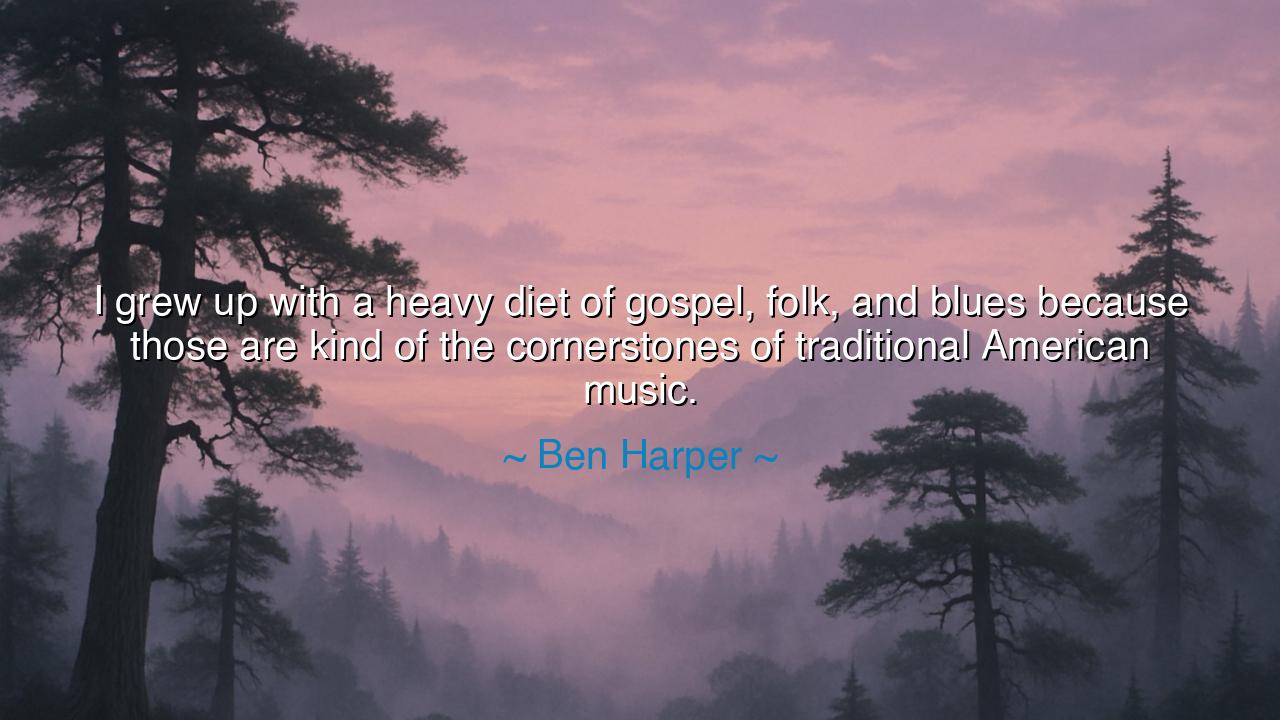
I grew up with a heavy diet of gospel, folk, and blues because
I grew up with a heavy diet of gospel, folk, and blues because those are kind of the cornerstones of traditional American music.






"I grew up with a heavy diet of gospel, folk, and blues because those are kind of the cornerstones of traditional American music." – Ben Harper
In this reflection, Ben Harper speaks not only as a musician, but as a keeper of cultural memory. His words carry the weight of heritage, the reverence of one who has listened deeply to the voices of the past. When he says he grew up on a “heavy diet of gospel, folk, and blues,” he is not describing mere music preferences—he is describing a spiritual education. These genres are not just sounds; they are vessels of history, emotion, and truth. Each note, each lyric, is the echo of struggle and triumph, of prayer and endurance, of the human spirit finding its voice in the face of hardship. To be raised on such a diet is to be nourished by the essence of a people’s soul.
The origin of Harper’s sentiment lies in the soil of America’s earliest music—born from the collision of pain and hope. The gospel, sung in churches and fields, was the cry of the spirit toward heaven, a song of deliverance and faith in the midst of suffering. The folk carried the voice of the working man and woman, telling stories of the land, of love, of injustice, and endurance. And the blues, that haunting, beautiful lament, rose from the heart of the oppressed, giving form to sorrow and transforming it into art. These three streams—gospel, folk, and blues—flowed together to create the river that is traditional American music. In this river, one can hear the story of a nation’s conscience, the soul of its people, and the echoes of every heart that has ever yearned for freedom.
To call these forms the “cornerstones” is to acknowledge that all later music—jazz, rock, soul, country, even hip-hop—stands upon their foundation. Just as a great temple rests upon the stones laid by its builders, so does modern sound rest upon the hands and hearts of those who first sang without amplification, without fame, without anything but faith and feeling. Harper’s recognition of this truth is not nostalgia; it is humility. He understands that to make music without honoring its roots is to build a house upon sand. His art, infused with these traditions, becomes not imitation but continuation—a living dialogue between past and present.
There is a story from the time of the African griots, the storytellers and musicians who preserved the history of their people through song. When the griot sang, he was not performing for pleasure alone—he was keeping memory alive. His melodies carried the lineage of families, the triumphs of ancestors, the grief of lost generations. In America, the same spirit lived on through those who sang the blues in the fields of Mississippi, who lifted their voices in gospel choirs, who strummed the humble chords of folk ballads in small towns and dusty roads. Through them, the ancient art of remembrance survived. Harper, like the griots of old, becomes a bridge between memory and music, ensuring that the flame of tradition does not fade in the noise of modernity.
But there is something deeper still in his words—a lesson for all who create, not only in music but in life. To have a “heavy diet” of these roots is to be formed by truth, to be nourished by authenticity. In every craft, there is a foundation—those elemental forces that give strength to all that follows. The wise do not despise their beginnings; they drink deeply from them. Just as a tree draws power from its roots, so too must we draw power from the traditions that shaped us. To forget one’s roots is to weaken the soul; to honor them is to grow strong and unshakable.
In the same way that Harper listens to the music of his forebears, each of us must learn to listen to the songs of our own origin. What are the “cornerstones” of our being? What values, stories, or teachings have shaped us? When we remember these, we find clarity; when we forget, we drift. The folk remind us to speak truth; the gospel reminds us to hope; the blues reminds us to feel. Each genre teaches a part of the human story, and together they remind us that sorrow and joy, struggle and song, are never far apart.
The lesson, then, is this: honor your foundation. Whatever path you walk—whether of art, work, or wisdom—remember the songs that built the road beneath your feet. Study your origins, and carry them forward with reverence and renewal. Let your life, like Ben Harper’s music, become a harmony of gratitude and growth. Do not chase novelty for its own sake; seek truth, and truth will make your work timeless.
So let Ben Harper’s words stand as a hymn for every creator, every seeker of authenticity: the soul grows strong when it feeds on what is real. The future must be built upon remembrance, and the new must arise from the old. For when we nourish ourselves on the music of our beginnings—be it the gospel of the heart, the folk of our families, or the blues of our trials—we do not merely create art; we sustain the great chorus of humanity that began long before us and will, if we listen well, continue long after we are gone.






AAdministratorAdministrator
Welcome, honored guests. Please leave a comment, we will respond soon